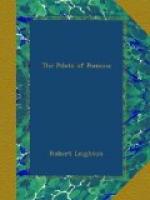But, of course, no person had ever found trace of it, and Mr. Drever supposed that it must have been swept away by the furious storms that, in wintertime, dash continually against the rocky ribs of the Orcadian coasts.
We got down by a pathway to the sloping beach, which the tide had left bare. At the point where we hoped to find some seals, we observed several men and women gathering seaweed, preparatory to burning it for kelp. This was a disappointment to us, since, if there were any seals about, it was likely they would be scared away by the kelp burners. But we walked along under the high banks as far as the northern extremity of the bay, in expectation of finding some sport on the outer shores.
We sat for a long while talking, as schoolboys will talk, in a sheltered cleft of the headland, which, I believe, had once been a cavern, and was known by the name of the Kierfiold Helyer. Here the force of many an Atlantic storm had so worn away the face of the rocks that the cliff was driven back to the innermost parts of the original cave. Great pieces of granite lay about in disorder, showing where the roof of the cavern had fallen in; and on one of these boulders we sat until we were weary, looking out to the water’s edge, in expectation of seeing some seals appear.
Skaill Bay was our favourite spot for the sealing, and at the proper season the seals were generally plentiful and not timid. Indeed, so bold were they sometimes, that on a Sabbath morning, when the bell of Sandwick Church, hard by, had been ringing for divine service, I have seen the animals collect in numbers on the beach to listen to the strange sound, which held them so fixed and charmed, that it required an effort to startle them away. Now, however, the seals seemed to have deserted the place, and I was not sorry when Tom Kinlay proposed that we should give up our search for them and return home.
Just as we were moving away I chanced to look along the shoreline, and at some distance from where we stood I detected a moving object in the water, and presently saw what I took to be three seals basking on a bank of sand. Now was our weariness changed to eager desire, and we at once prepared for some good sport.
Leaving our dead falcon on a slab of rock, we quietly distributed ourselves. Willie Hercus approached the seals under cover of a large boulder. I crept along by the foot of the cliffs with Selta, intending to get down to the water’s edge, and so work back again to cut off the retreat of the seals; while Kinlay and Rosson did the same on the other side.
We gradually and silently closed round our game. Our approach was, however, somewhat marred by an alarm given by a seagull flying over the seals. The largest animal turned round towards the sea. Its mates took the signal and, with it, made for the water.




